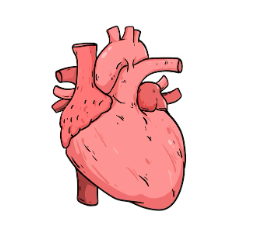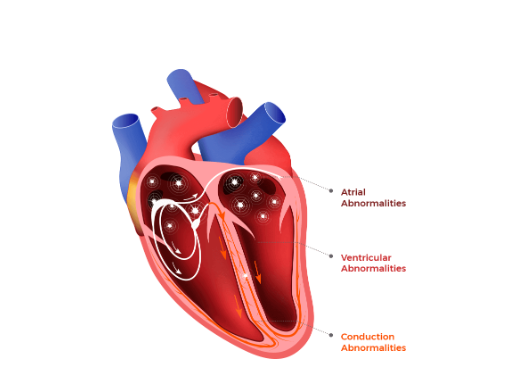By: Geraldus Sigap

The heart beats in a steady rhythm, pumping blood throughout the body to keep you alive and well. For most people, this rhythm feels normal and reliable. However, there are times when the heart’s natural beat may feel irregular, too fast, or too slow. This condition is called arrhythmia, and it can range from being harmless to potentially serious. While many people dismiss occasional fluttering or skipped beats, understanding arrhythmia is essential, as it can sometimes signal underlying health problems that need medical attention.
Arrhythmia is a condition where the heart’s rhythm becomes abnormal. In a healthy individual, the heart beats in a regular pattern, controlled by electrical signals that coordinate its contractions. These signals ensure that the heart pumps blood efficiently to the rest of the body. When something disrupts these electrical signals, the heartbeat can become irregular.
Arrhythmias can occur in several forms: the heart may beat too fast (tachycardia), too slow (bradycardia), or in an irregular pattern. While some arrhythmias are harmless and temporary, others may affect blood flow, putting strain on the heart and increasing the risk of complications like stroke or heart failure.
The symptoms of arrhythmia can vary depending on its type and severity. Some people with arrhythmia do not experience any noticeable signs, and the condition is only detected during routine medical check-ups. For others, symptoms may include:
- Heart Palpitations: A fluttering sensation, skipped beats, or a racing heartbeat.
- Shortness of Breath: Difficulty breathing, especially during physical activity.
- Dizziness or Lightheadedness: Feeling faint or unsteady.
- Fatigue: Unexplained tiredness, even after rest.
- Chest Pain or Discomfort: A feeling of tightness or pressure in the chest.
- Fainting (Syncope): In severe cases, irregular heart rhythms may cause loss of consciousness.
These symptoms can be alarming, but they do not always mean something serious. If you experience these signs frequently or suddenly, it is important to consult a doctor to determine the cause.
Arrhythmia can be caused by a variety of factors, ranging from lifestyle choices to underlying health conditions. Some common causes include:
- Heart Conditions: Diseases like coronary artery disease, heart failure, or congenital heart defects can disrupt the heart’s rhythm.
- High Blood Pressure: Chronic hypertension can put stress on the heart, leading to arrhythmias.
- Electrolyte Imbalances: Abnormal levels of minerals like potassium, calcium, or magnesium can affect the heart’s electrical activity.
- Thyroid Problems: An overactive or underactive thyroid gland can impact heart rate.
- Stress and Anxiety: Emotional stress can trigger irregular heartbeats, particularly in otherwise healthy individuals. Panic attacks, a form of acute anxiety, can also lead to irregular heartbeats, as the body’s fight-or-flight response releases adrenaline that affects the heart’s rhythm.
- Stimulants: Excessive caffeine, nicotine, alcohol, or certain medications can interfere with heart rhythm.
- Sleep Apnea: Interrupted breathing during sleep can strain the heart, leading to arrhythmias.
In some cases, arrhythmia occurs without a clear cause. This is why it is important to undergo a medical evaluation to identify any underlying triggers.
Arrhythmia is not a one-size-fits-all condition. It can present in different forms, each with its own characteristics:
- Atrial Fibrillation: One of the most common types, atrial fibrillation causes the upper chambers of the heart to quiver instead of beating effectively. This can lead to an irregular and often rapid heartbeat, increasing the risk of stroke.
- Bradycardia: This occurs when the heart beats too slowly, which can prevent enough blood from reaching the brain and other organs. It often results in fatigue and dizziness.
- Tachycardia: A rapid heartbeat that exceeds the normal range. It can occur in the upper or lower chambers of the heart and may cause palpitations and breathlessness.
- Ventricular Fibrillation: This is a life-threatening form of arrhythmia where the heart’s lower chambers quiver instead of pumping blood. Immediate medical attention is required.
Understanding the type of arrhythmia you may have is crucial, as it determines the best course of treatment.

Figure 1. Heart abnormalities
- Electrocardiogram (ECG): This is a quick, painless test that measures the heart’s electrical activity and identifies irregular rhythms.
- Holter Monitor: A portable device worn for 24-48 hours to record the heart’s activity over a longer period. It is one of the easiest and least invasive tests available, offering a comprehensive view of the heart’s rhythm over time. By monitoring the heart during normal daily activities, the Holter test increases the likelihood of detecting intermittent arrhythmias, providing a more accurate diagnosis.
- Echocardiogram: An ultrasound of the heart that provides detailed images of its structure and function.
- Stress Test: This test evaluates how the heart performs during physical activity.
- Electrophysiology Study: A specialized procedure to study the heart’s electrical system and pinpoint the source of the arrhythmia.
The treatment for arrhythmia depends on its cause, type, and severity. For mild cases that do not pose health risks, no treatment may be necessary. However, if the arrhythmia is causing significant symptoms or complications, treatment options may include:
- Medications: Anti-arrhythmic drugs help control the heart’s rhythm and prevent further episodes. Blood thinners may also be prescribed to reduce the risk of stroke.
- Lifestyle Changes: Reducing stress, avoiding stimulants like caffeine or nicotine, and maintaining a healthy diet can improve heart rhythm. Regular exercise and weight management also play a role.
- Medical Procedures: Treatments like electrical cardioversion or catheter ablation can correct abnormal rhythms. In severe cases, a pacemaker or implantable defibrillator may be recommended to regulate the heartbeat.
By working closely with a healthcare provider, arrhythmia can often be managed effectively, allowing individuals to lead normal, active lives.
RS Abdi Waluyo understand the importance of early diagnosis and expert care for conditions like arrhythmia. Our team of internal medicine specialists and cardiologists provides comprehensive diagnostic evaluations and tailored treatment plans to address your heart health needs. Equipped with advanced technology, such as electrocardiograms, echocardiography, and electrophysiology studies, RS Abdi Waluyo ensures accurate diagnoses and effective management of heart rhythm disorders.
With a patient-centered approach, we aim to provide world-class care in a comfortable and supportive environment. Whether you are experiencing occasional palpitations or persistent symptoms, our team is dedicated to helping you achieve better heart health. Do not ignore the signs of an irregular heartbeat!
Resources
- Heart Arrythmia Types & Irregular Heartbeats in Dilated Cardiomyopathy [Homepage on the Internet]. DCM Found. [cited 2024 Dec 17];Available from: https://dcmfoundation.org/about-dilated-cardiomyopathy/dilated-cardiomyopathy-and-common-arrhythmias/
- Arrhythmias – StatPearls – NCBI Bookshelf [Homepage on the Internet]. [cited 2024 Dec 17];Available from: https://www.ncbi.nlm.nih.gov/books/NBK558923/
- Kingma J, Simard C, Drolet B. Overview of Cardiac Arrhythmias and Treatment Strategies. Pharmaceuticals 2023;16(6):844.
